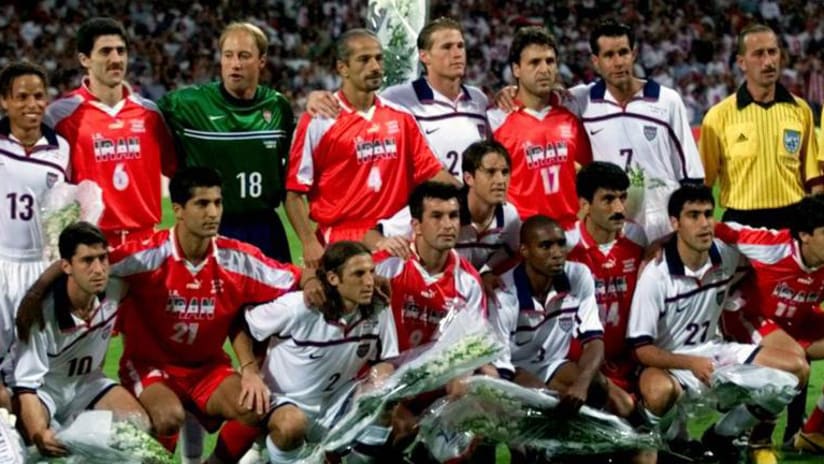The intersection of soccer and an era’s political zeitgeist tends to resemble a pair of muddy streams flowing into the same reflecting pool. In the sense that sports are an extension of daily life, and soccer is an extension of every nation’s makeup, separating the game from the times in which it inhabits is quite literally impossible.
Why you’d even want to is perhaps a question for another day.
When it comes to American soccer, we'll be experiencing another one of those politics-meets-soccer moments this Friday when the US national team faces its Cuban counterpart in a friendly on Cuban soil (4 pm ET on ESPN2 and UniMas). But there are plenty of other examples and some of the most memorable are embedded in the fabric of the US’s long, somewhat checkered national team history.
The game can come to represent more than rows of sod and a ball. Here are five examples of times when politics and soccer collided in America in a way we’ll never forget.
US Men’s National Team vs. East Germany (April 1, 1990)
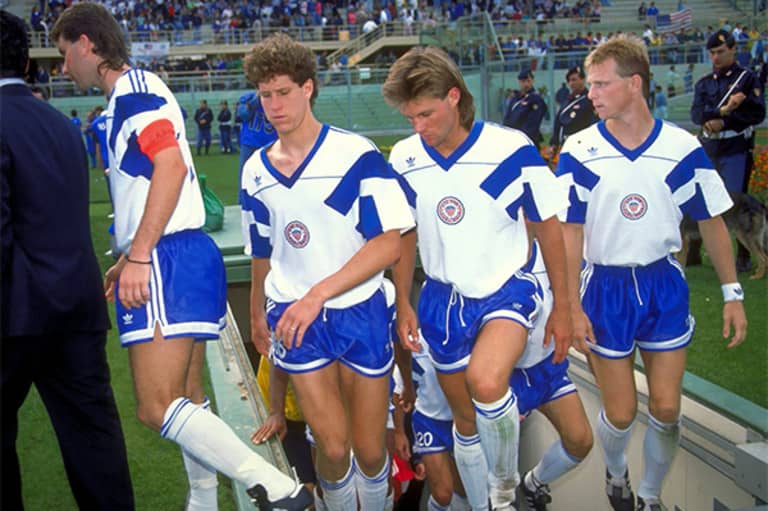
The US national team walks out on the field at the 1990 World Cup in Italy. They faced East Germany in a warm-up leading up to the tournament. Photo via Action Images / David Jacobs
On Nov. 9, 1989, the Berlin Wall fell. Five months later, the US and East Germany played a game of soccer. In the former East Germany.
After a tension-fraught 1989, the following year passed in a sort of strange haze in former Soviet-controlled sectors of Germany. The Cold War was over, brought to heel by the world’s modernization and the slowly crumbling infrastructure of the Soviet Union. While the impact on the western side of the Berlin Wall was relatively minimal, the east was about to go through a wholesale change.
The East German national team never lived up to the successes of their Western counterparts, failing to ever qualify for a Euro tournament and only getting to a World Cup once, in 1974, when they famously beat West Germany in a group game. After a gold in the 1976 Olympics and a bronze in 1980, things were relatively quiet on the title front for East Germany.
Still, the arrival of the Americans in 1990 was monumental for a few notable reasons.
The obvious was political in nature, the two joining tired hands across the shattered remnants of the wall to help tie together cultures riven by a decades-long conflict largely waged in silence. The match was played at the 10,000-seat Berlin Sportforum and the East Germans won 3-2 in a game devoid of the political energy it might’ve had a year earlier. But it also played a role in helping the US gear up for its first World Cup in 40 years later that summer, a year of turning points in more than one arena.
US Men’s National Team vs. Kuwait (July 27, 1992)
There are soccer games, and there are nationalistic pep rallies, and sometimes it can be somewhat difficult to differentiate between the two.
The US adventure at the 1992 Olympics – its third straight Olympic Games in men’s soccer – was mostly concerned with Italy at first blush. The world soccer power was drawn with the US and took up most of the spotlight as the primary impediment to the US advancing beyond the group stage. With world superstar Roberto Baggio leading the way, it didn’t look particularly good.
The match with Kuwait was almost easy to overlook in comparison, but the atmosphere at the game itself quickly caught the world’s attention.
The Gulf War, which took place in a small window of time the previous year, famously witnessed American forces throwing Saddam Hussain’s Iraqi army back from Kuwait, which Iraq invaded and annexed in 1990. The Kuwaiti population, understandably appreciative of this act, suddenly had a perfect venue to express its pro-American sentiment directly to Americans in a global forum.
What better place than at a soccer match between the two?
The Kuwaitis in Zaragoza, Spain watched the US win 3-1 to keep alive hopes of advancement (the US did not advance), but that paled in comparison to the reaction after the match. In the postgame handshake line, Kuwaiti players “kissed, hugged and slapped the backs of the bewildered American players. With tears in their eyes, they praised the United States for helping liberate their country during the Gulf War,” according to the Los Angeles Times. It was a scene nobody in attendance will likely ever forget.
US Men’s National Team vs. Iran (June 21, 1998)
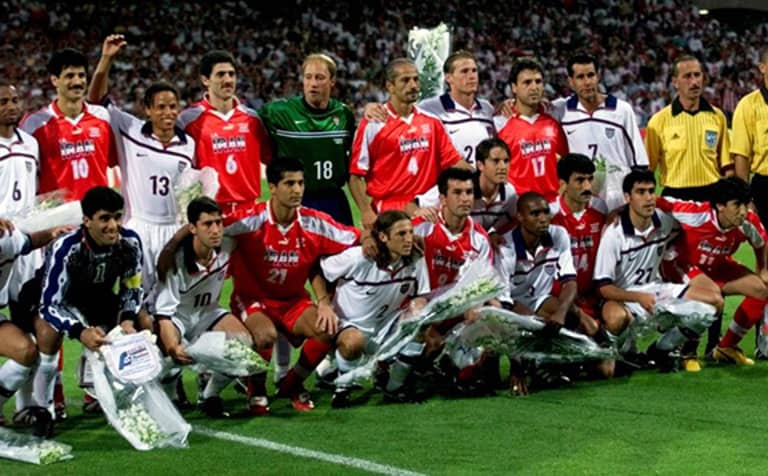
US and Iranian national team players pose in a memorable joint photo before their 1998 World Cup group match in France. Photo via AP
The draw hit the US like a runaway locomotive. The New York Daily News ran the furthest with its headline, dubbing it “World Cup War.” Then-US Soccer Federation president Alan Rothenberg joked that, “all we need is an Iraqi referee.”
US-Iran at the 1998 World Cup would indeed be, as Sports Illustrated termed it at the time, “A Devil of a Draw.”
At the time, tensions between the two nations had been simmering at a low boil since the 1979 hostage crisis in Tehran created an animus of anger between the governing bodies of the two growing world powers. At the time, Iran was headed by moderate reformist president Mohammad Khatami, and the players did their best to defuse the tension of the moment on both sides. The messages from the locker room were simple: It’s just a game.
The pre-match buildup was dripping with political intrigue, so much so that by the time the match began there was no question it wasn’t simply a game. TV cameramen strategically avoided protest banners from the nearly 7,000 members of an anti-Iranian Iraqi group. The US had to walk toward the Iranian players for the prematch handshake – and not the other way around – to satisfy Iran’s demand that the Iranian players not be seen as the ones walking toward the Americans. Before kickoff the teams also posed for a photo that showed the game can transcend the politics of the moment as the US quietly prepared to trudge home empty-handed.
The match itself went off without wider incident. The US was on its way to its worst ever showing in a World Cup, and Iran duly dispatched the Americans 2-1 to eliminate them from knockout contention.
US Men’s National Team vs. Cuba (Sept. 6, 2008)
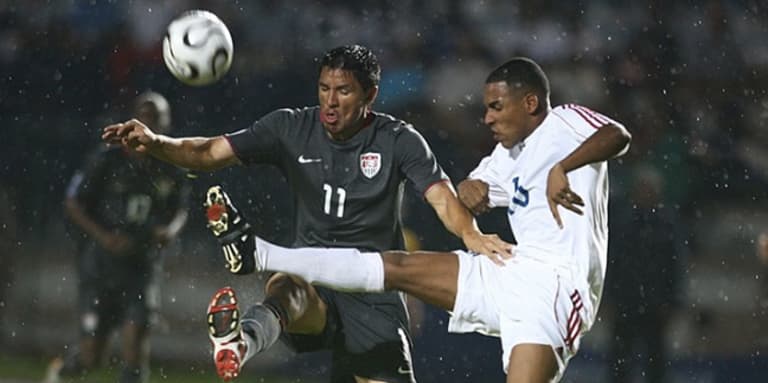
Former US national team and MLS forward Brian Ching in action against Cuba in a 2008 World Cup qualifier played in Havana. Photo via Simon Bruty / Getty Images
As the US prepared to hand off its presidency from George W. Bush to Barack Obama, Cuba was in the midst of a political shock to its collective system. On Feb. 20, 2008, Fidel Castro ended one of the longest autocratic Communist rules in history by stepping down from the Cuban presidency after 32 years. Citing his failing health, Castro’s resignation began the Caribbean nation’s long slog back from its insular political track of the last half-century.
The US didn’t have to wait long to participate in Cuba’s dramatic act of flinging open its doors.
Seven months after Castro left office for good, the US played a World Cup qualifying match in Havana. It was the first time the US national team had been to Cuba for a match in 61 years. In fact, Cuba’s post-Castro future was still so fresh that the travel embargo hadn’t yet lifted, meaning the smattering of American fans who traveled to the match clad in American flags and star-splashed bandanas did so illegally. They risked jail time if they returned through US Customs with a Cuban stamp on their passports.
The game itself was buffeted by the prologue to a tropical storm, the sky graying over two hours before the match and then pelting the Estadio Pedro Marrero with one of those pop-up equatorial rainstorms for the match’s duration. It wasn’t a 90 minutes to remember between the lines. The US won 1-0 off a scrappy Clint Dempsey goal and went on its merry way toward qualifying for South Africa 2010.
But off the field the scene was one to behold. The cheers for Landon Donovan were reportedly louder than for any other player – even among Cubans – and those same Cuban fans even cheered the end of "The Star-Spangled Banner" after it finished over the stadium loudspeakers. The significance of the moment was hard to miss as it heralded the beginning of a new diplomatic era between the two nations, both on and off the field.
US U16 Girls National Team vs. Iran (April 26, 2016)
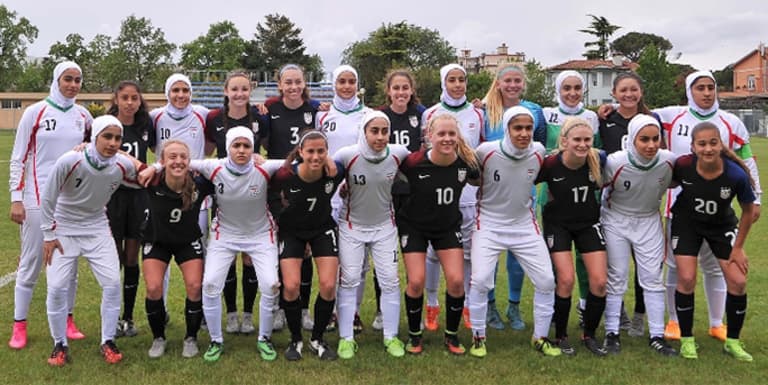
The USA Under-16 national team pose with their counterparts from Iran in a photo reminiscent of the senior men's national team at the 1998 World Cup. Photo via US Soccer
When you talk about the collision of politics and sport, there tends to be a crackling tension hanging in the air between the two. Like Jesse Owens at the 1936 Olympics, or Muhammad Ali’s commentary on Vietnam, or even the famed runner at Marathon who warned the Athenians of the coming of the Persian fleet. Conflict tends to exist between sport and politics like connective tissue.
Sometimes, though, there’s simply the warming afterglow of goodwill. And that’s precisely what happened between two of the world’s current superpowers.
Unlike the US-Iran match in 1998, there was no fanfare following the Under-16 Girls National Team into their meeting with their Iranian counterparts earlier this year in Italy. No headlines, no commentary from federation heads, no diplomats remarking off the record on what the match could mean for embargoes and treaties and whatever else. There was simply a game on the schedule.
But the subtext of the match was loftier than its anonymity let on. No US women’s team on any level – from the U-15s all the way up to the senior team – had ever played Iran in a competitive soccer match. The Americans happened to draw Iran in the first International Women’s Tournament of Gradisca, a competitive six-team tournament that took place near the Italian border with Slovenia.
The US won handily, a Summer Yates hat trick guiding the Americans to a comfortable 6-0 win. But the score was painfully aside from the point. Before the match, the two team captains met at midfield for the pennant exchange, and the photo quickly became iconic in the history between the two nations. An Iranian player in a hijab and an American smiling and shaking hands.
A moment both nations can wholeheartedly rally behind.

